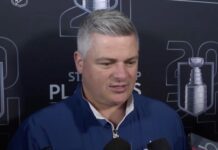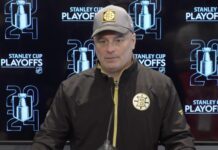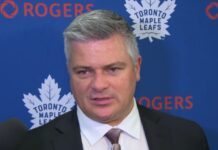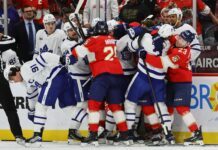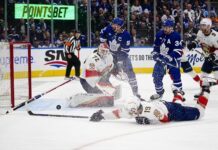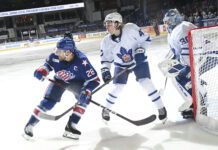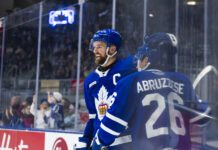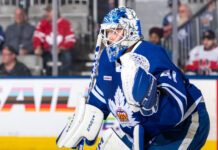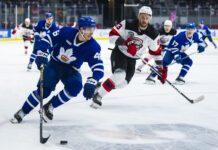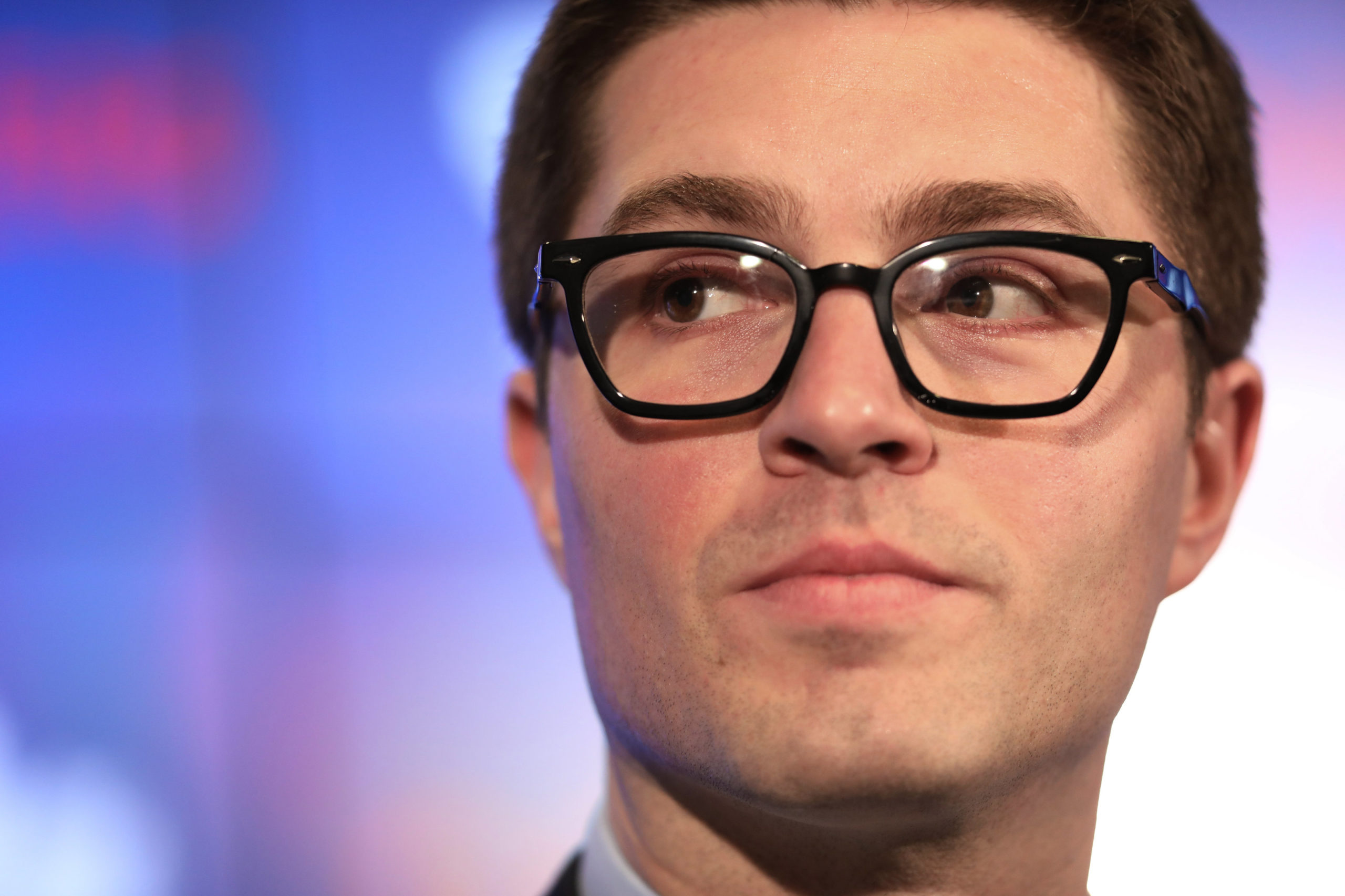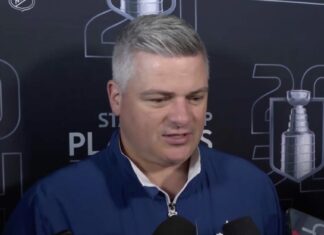On the eve of the 2020 NHL Draft, General Manager Kyle Dubas discussed the Leafs brass’ approach to the virtual draft, interest in moving the #15th overall pick, player development in the pandemic era, Frederik Andersen’s future, the impact of the flat cap, the signing of Jason Spezza, Tampa Bay’s Cup win, and the team’s new assistant coaches.
Video of the interview should be available later at the Leafs’ video vault.
Dubas on the draft: 2020 draft depth, the likelihood of moving the pick, BPA vs. positional need & more
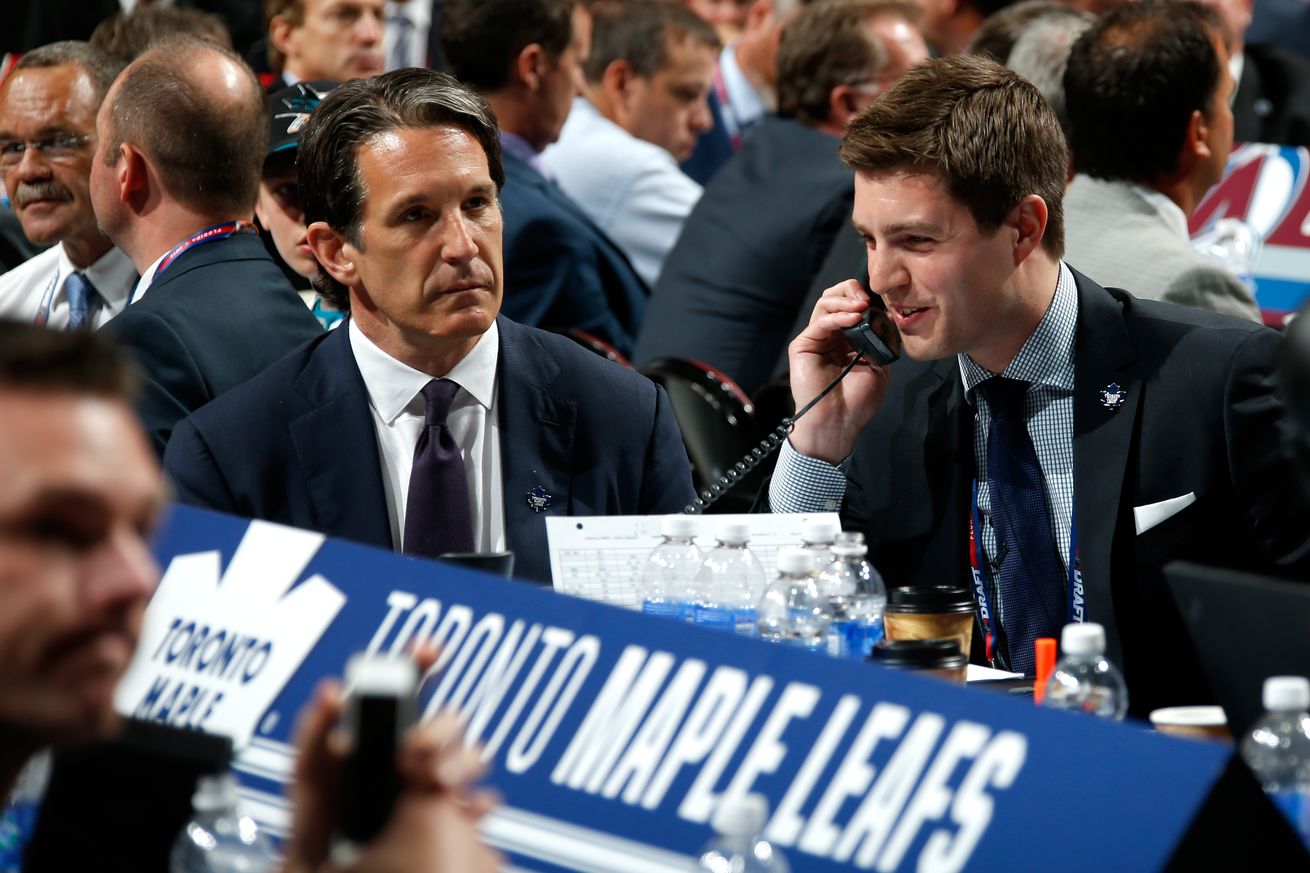
How likely do you think it is that you use the pick tomorrow night — the #15 pick — or is it still something that might be traded?
Dubas: With this draft being a little bit different and not being live and in person, there has been a little more discussion on shifting around picks in the first round. There seems to be a lot of interest in moving up in the round for whatever reason. We are going through that.
We have some final meetings here this afternoon into this evening and then again tomorrow. We will sort of establish when and how we would make the pick and whether we would move out of it — whether it is to move up in the draft to select something, or move back in the draft, or trade for players.
It is really all on the table right now. I don’t think, with where we are at, we can turn away from considering anything. I would love to give you a percentage or some level of certainty about what we will do, but I don’t really know at this point. We have to consider everything given the circumstances we are in and the league is in.
Have you had anything come close when it comes to moving the pick?
Dubas: We’ve had lots of different discussions on it, but nothing that I would say has been overly close. Things can change at any minute. There has been lots of discussion and tire kicking, but nothing close as of yet that would really compel us to look to move it.
What are you anticipating your setup will be like for the draft tomorrow with it being virtual?
Dubas: Reid Mitchell and the staff at MLSE have worked tirelessly to create an atmosphere that is safe — socially distanced but also be able to try to have everybody together. So far, we have had all of our meetings virtually — even these final meetings — with everyone in separate offices, especially as caseloads have continued to rise in Ontario and Toronto. We have maintained all of those practices that Toronto Public Health and the Ontario government have pushed us to.
Tomorrow, we will work to operating out of the dressing room here at Scotiabank Arena. Steve and the social team will send out some images of that setup for everybody so they can have an idea of what tomorrow will be like for us. But we will not have too many of us here, which is very unusual. We usually have our whole scouting staff. This season, we only have John Lilley — our director of amateur scouting who has traveled in from Boston — and everyone else has been on Zoom.
It won’t be that different from the experiences in Sault Ste. Marie. The draft there was held virtually so that every team was in their own individual market with their own setup. It will be much different than the previous five or six drafts I’ve experienced here, but I am fortunate to have some experience like from the OHL where you are sitting in your own room and you see the picks come in via TV or the conference call.
With the draft being typically held in June, how has the extra time served the organization well for decision making and doing your due diligence when it comes to picks and prospects?
Dubas: I think it was March 12th that everything shut down, and by the end of the day on the 12th, every hockey league in the world was essentially shut down. The next day, we had a conference call led by Reid Mitchell and John Lilley and Dave Morrison and Wes Clark. Right away, we pivoted the way we did our scouting and shifted everything to video and tried to maximize our coverage of everybody with everybody involved in the scouting process cross-checking the players and so on. I think we have a very deep read on every player. We have covered a lot of games using the resources in terms of video and coverage we have.
In terms of the number of games we have seen, this year would certainly be the best. They’re not live viewings and they are on video, which does have some limitations, but in terms of the amount of deep work that has been done on every prospect, I would say this year far surpasses the previous years. We will probably take some of the elements we’ve learned with us as things hopefully return to normal in the coming months and years.
What is your assessment of how deep this draft is? If you do pick at #15, how quickly do you think that player might help you in the NHL?
Dubas: It seems every year at the draft, everyone says it is a deep draft, but I would say this year certainly carries more of that narrative than others. I am always tentative to rank the drafts at the time because they usually take four or five years to get a true read of how many guys are truly going to pan out. This season, with the amount of time everyone has had to invest in the draft — particularly from March to June — there has certainly been a lot more focus and attention on it across everybody in hockey. That’s not just the people working in scouting but in management, coaches, media, and so on during the pause when there wasn’t a whole lot going on in the world. It gave you a chance to kind of do deeper dives on the draft.
We are happy with the depth of the draft. It is one of the reasons why we made the trade with Pittsburgh knowing their pick and to land ourselves in this slot. We have 11 picks in the draft, so we are excited about it. It is a great opportunity for us.
With regards to how soon the player we pick at 15 or 44 can make it into our lineup, for better or worse, the economics and the ways that they’ve changed in the last number of months are going to put a major focus on development and having younger players that have tremendous talent try to get to the league as soon as possible. That is not to say we would rush anybody unjustly, but these players in terms of their training and physical development tend to be — every year it seems — further and further along. Nick Robertson is probably the latest example of that with us.
I never try to limit them. Certainly, there is going to be a need — not just here but all across the league — for talented players on entry-level contracts to be contributing. I don’t know how soon that will be, but I would say it is probably going to expedite itself a little bit for all teams, would be my forecast.
If you keep the 15th pick, is there a specific player or position you are looking at?
Dubas: The last two first-round picks we’ve had, we’ve used on defense. That is not to say that we wouldn’t use another on D. Our philosophy has always been that when we get there, because it is not like football or basketball even — where the player is going to make an immediate impact on your roster — the way that we have always approached it is to just select the best player and not reach for position. There is always a bit of a pull to do that when there are certain holes on your roster, but because the lag time between the draft and making an impact on the NHL roster isn’t as quick as it is in some other sports, sticking to who we feel is the best available player is the way to help the team best moving ahead.
How do you go about developing players when they might even be able to play hockey in certain locations? Are the concerns with a developmental gap for this generation of players?
Dubas: One of the things that we’ve had to accept in the last number of months is that development is going to be different. We have tried to adapt to that a little bit already by signing some of our players to different places in Europe, whether it is Egor Korshkov to Lokomotiv or Filip Kral. We’ve got Kristian Rubins, who we just assigned to a club in Denmark, actually. We’ve got a few players that we’ve signed. We’ve got Filip Hallander in the SHL as well. There is that option for the development in terms of playing actual games.
When it comes to some players that are in North America or have other needs, as much as it is disappointing that there aren’t games right now and that the health of the world needs to come first, it also presents a tremendous opportunity for a younger player that maybe has some physical and strength limitations to make major gains without having to focus on playing any games at all. You can really focus on your strength and conditioning with various different skating coaches and instructors and really make gains in terms of your strength and on-ice technical ability, even though I know games are much more fun.
We have to worry about what we can control and do the absolute best to maximize the circumstances that come our way and carry on our development in different ways. It has been challenging, but the development staff had the virtual development camp with our players in August and we tried to help the players as much as we can.
Will not knowing when the CHL season will start impact you and other GMs at the draft knowing you have a window of two years to get them signed whereas with NCAA and Euro players, there is a longer period of evaluation?
Dubas: It is actually not even two years now. We are going to draft them Tuesday and Wednesday, and you’ve already lost four of the 24 months you usually have. It doesn’t seem like we will be able to get them in for a development camp to work with our people. The runway there is certainly much shorter than it usually is.
Because there is so much uncertainty and so much unknown, I still think we would defer to picking the best players for the group and rolling from there. Because of the connections we have in the CHL — whether it is Tim Speltz and his role in Spokane, myself with the Soo, Jimmy Paliafito with Saginaw, and the tie-ins in the Quebec league with Real Paiement and others — I think we would be fairly confident. The teams out there realize this and I think they are more than willing to try to work with you on any access you can safely have health-wise. They are more than willing to grant it.
I don’t think it will be a huge deal other than the fact that the runway is a little bit shorter and we are going to have to hit the ground running in terms of our integration and getting the players into our development model.
Dubas on the Jason Spezza signing, free agency plans, the flat cap, and Frederik Andersen’s future
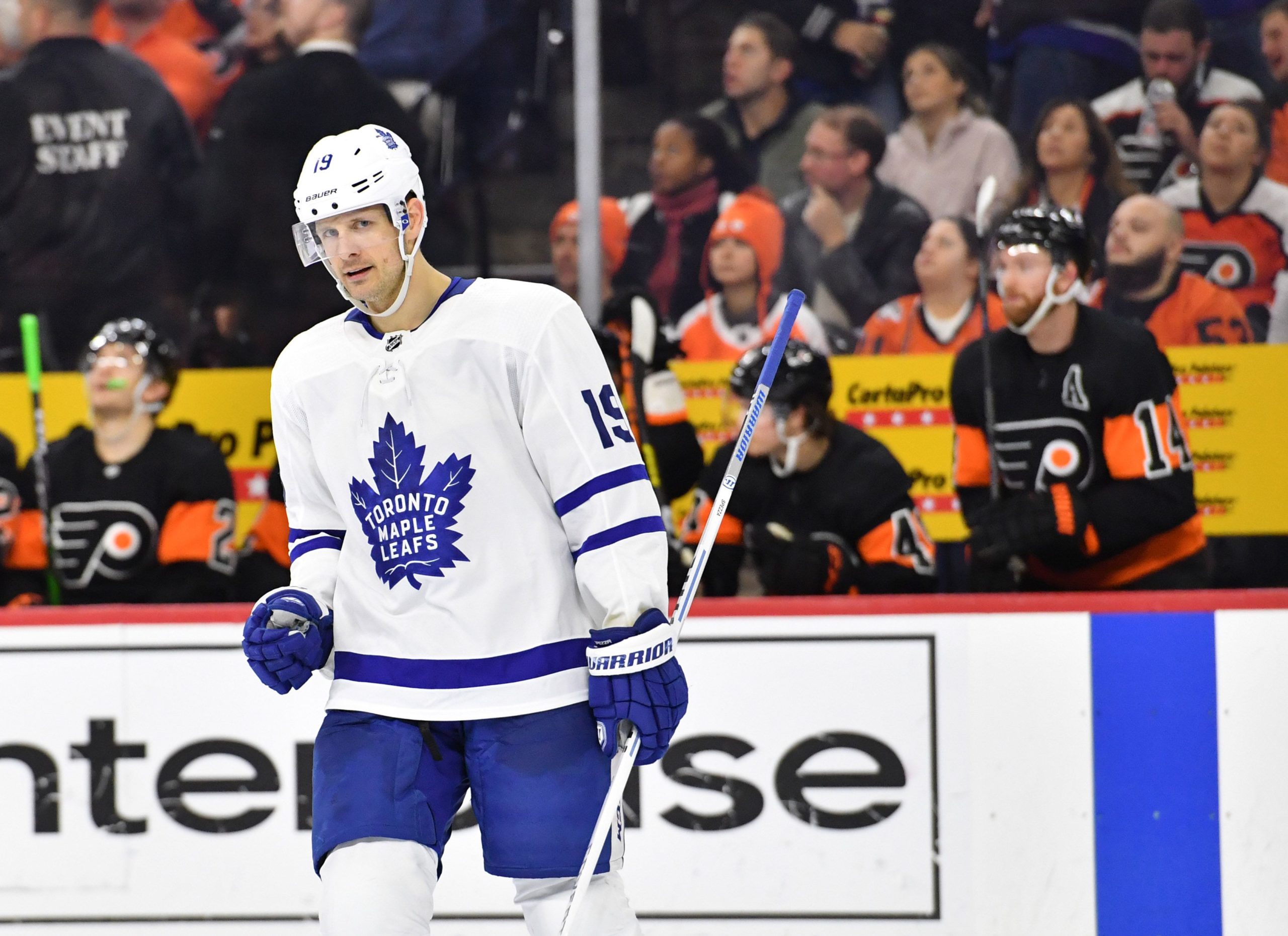
Can you address the Jason Spezza signing?
Dubas: A few weeks after the conclusion of the season, Jason and I sat down and had a discussion about where he felt he was at, if he wanted to continue, and how he felt about his role on the team. He and I had a conversation and then he subsequently had a discussion with Sheldon about his role and what was expected of him and what he could expect from Sheldon and myself as we roll ahead.
It just seemed like it was a great fit. The image of Jason is that he is a veteran more in the mold of Roger Dorn, but I view him more as a Jake Taylor-type to use that analogy from Major League. He has been excellent with our young players. He has great experience and works his butt off every single day in the facility. He has just been an outstanding addition for us.
I didn’t really know a year ago when he came in here about his work ethic and passion for the game and the fact that he desperately wants to win for obvious reasons. He is willing to spend as much time as any young player wants in helping them work through the start to their career and the various challenges in their career — even if they’re older players on the team — and uses his experiences from his career in junior and in the NHL.
We are fortunate to have him around here for another season.
What is the deal with making the Leafs harder to play against next season? You want it to grow organically, but what other steps do you think might be in the cards in order to reach that goal?
Dubas: It goes without saying we would like to be incredibly hard to play against. Some of that does have to happen organically as our players continue to mature and grow. A number of teams this year were examples of that as teams doing that with their own guys and altering their mindset and having some setbacks that have forced them to play a different way at times.
But also, there is no doubt it is something we would like to address through free agency and trades that come up. It is a priority of ours.
Where do you see the free agency market going in terms of a flat cap?
Dubas: With no interview period here, I really don’t know what it is going to look like. Unlike the previous number of years, we don’t really have the big-name, much-talked-about free agents of our own. I really don’t have a great read on what the structures of the contracts are going to look like and I likely won’t until Friday.
I have seen some of the contracts that have come in over the last number of weeks, and they certainly speak to players trying to back-load the contracts a little bit within the rules to try to maybe provide the team some economic relief and give themselves a better chance of making those dollars when escrow and various other limitations go down.
It is all hard for me to predict how it will all look on Friday, Saturday, and into the weekend, probably.
As you approach free agency and trying to fit everything under the cap, what do you think it is about Brandon Pridham that makes him so valuable to your organization?
Dubas: I talk to him 600 times a day with different questions. The major benefit that he has is that he will tell me very bluntly when what I am thinking is crazy and not workable. Just the number of different scenarios that he has planned out and the way that he is able to forecast contracts, and most importantly for us now, it is looking ahead to the next number of years… Whatever you are looking at to add to your mix is not only going to impact now, but if you look a few years out, we’ve got our core guys locked up for this season, but then you have Fred and Zach Hyman. A year beyond that, you have Morgan Rielly. If you don’t forecast the cap to go up, which the lag formula in the new CBA largely prohibits, everything that you do now is going to have a large effect moving out.
In the past, you used to be able to project — and we were very conservative with this — small gains in the cap each season. That is sort of out of the window now. With Brandon, more than any other time, having him forecast where that is going to go and where contracts are going to go is a massive, massive value. I don’t know that there is any person I talk to more in my day to day. His value to the team and myself is so incredibly massive because of his knowledge of the cap and the rules and the ways that we can be creative and make things work.
I couldn’t do it without him here, I guess, is the easiest way to describe Brandon Pridham.
Do you expect Frederik Andersen to be in goal for you opening night? Where do you go with that given his contract status?
Dubas: I know where the Fred speculation started and where it comes from. Rather than address it publicly or be hostile about it, I have just addressed it directly with Fred. He and I have had many discussions over the last month or so about that, so he knows where we stand directly. As of this moment, I expect him to be the starting goalie for our team whenever we get going here. That is the way I feel about Fred.
Dubas on lessons from Tampa Bay’s Stanley Cup championship
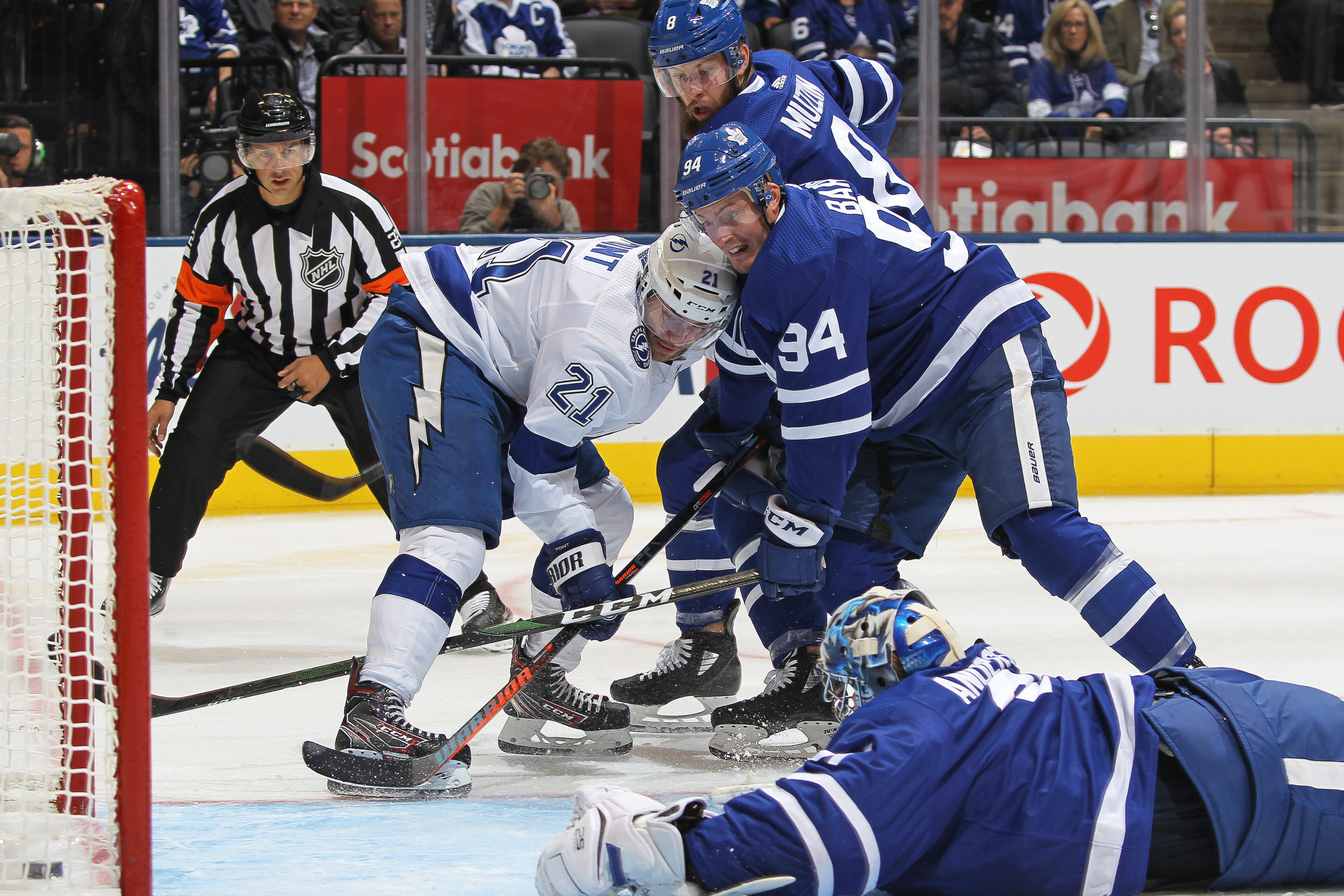
What did you take away from Tampa Bay’s win in terms of your club? Has it tweaked your views on roster construction or style of play? What did you learn from the final four teams that went deep?
Dubas: There are always things you can learn — not just in hockey but all of the other sports teams that go a long way in the playoffs and have very successful seasons. There is a lot we can learn from Tampa. I also think their situation is not exactly the same as ours for a number of different reasons. The natural inclination is to always hope to mimic the team that just won and to copy them, but as you see from year to year, it changes in terms of the style of teams that win — if you go to Pittsburgh’s two championships, then it was Washington, St. Louis, and Tampa.
You always want to continue to challenge yourself. We’ve had disappointing ends to our last four seasons in that we haven’t won and that is our goal. The things with Tampa that certainly stood out to me… The acquisitions they did during the year, Julien is a great GM and did a great job. They’ve got a great coach and a great core of players.
There are two things that I hope our whole organization takes: 1) They had a major disappointment after a record-setting regular season for them the year prior, and how it affected their mindset heading into the season in terms of their focus and competitiveness and how they wanted to play, and how it manifested itself through the regular season and playoffs. The fear that you always have or that I think about a lot is that you are going to hear a lot that our team is going to be judged in the playoffs — which it will — but one of the key things we have done the last number of years, whether it was the start of last year or the end of the 2018-19 season, was had bad stretches in the regular season that have cost us finishing higher in the standings and giving ourselves a more favourable position going into the playoffs. This year, that manifested itself in us being in a qualification round and not in the round robin.
The key for us that we can learn is how key the regular season is as well as our mindset, focus, and competitiveness every day in the regular season. The regular season serves you in the playoffs; it serves you in your positioning and in the fact that you have built a way to play competitively throughout the whole year. That serves you in the playoffs.
The other part from Tampa, in particular, is that I thought their best players faced huge questions after the 2019 loss. I thought their best players — each and every one of them –was spectacular in the playoffs. They were extremely competitive. They produced at a very high level. They responded when the team was down. As much as there is the focus on the changes around the outside of the roster — which I thought were great moves — I thought it was the top end of their roster and how competitive they were and how dominant they were from the minute they got inside the bubble all the way to the Stanley Cup. That really stood out to me and I hope that we take from it.
Dubas on the hiring of Paul MacLean and Manny Malhotra
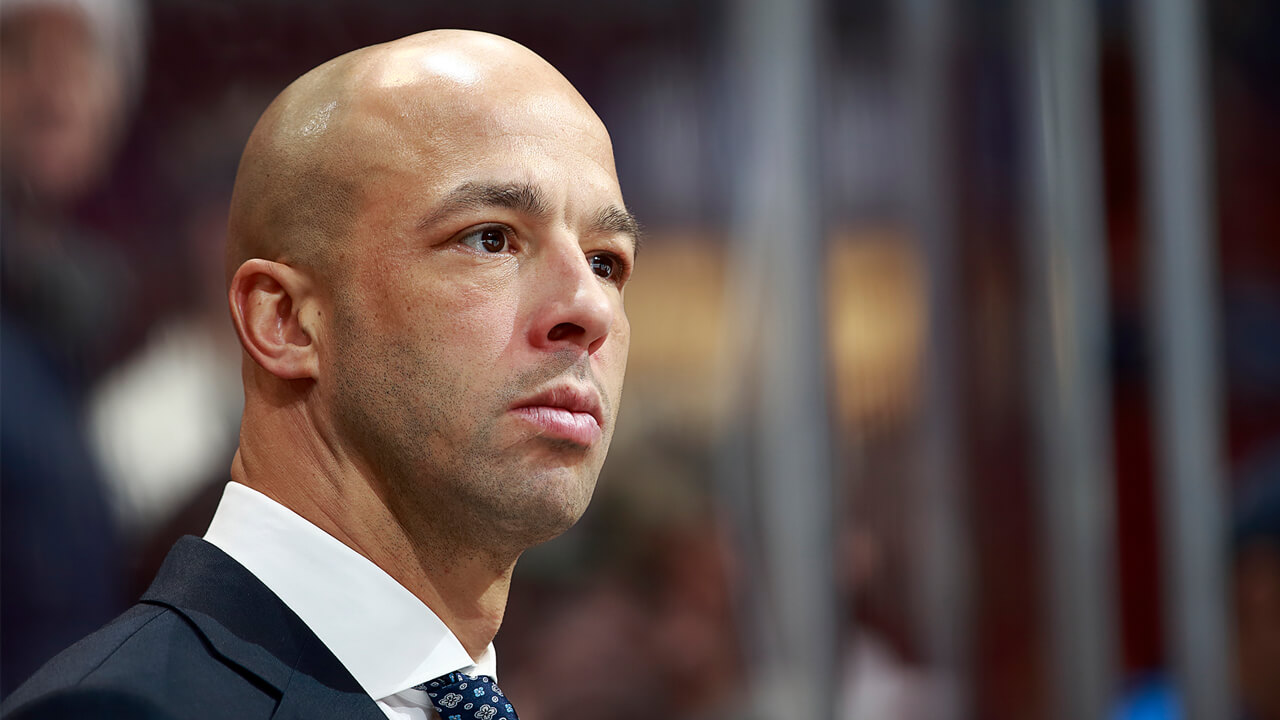
Can you comment on the two new assistant coach hirings?
Dubas: I would defer to Sheldon to speak more on the assistants, but the process that Sheldon really embarked on and I was a part of — he did a very, very thorough job on the background on all of the assistants that he had. Without knowing Manny Malhotra all too well, he had kind of focused on Manny from the beginning once he had done his background on all of these guys just in terms of his fit with his own experience and the job he heard he had been doing in Vancouver, and the style of player he was and what he brought to teams, and then his own intelligence level and the way he communicated. That was what was appealing about Manny for Sheldon. I will let him get more into the specifics of it. We just thought with his energy level and his communication and professionalism, he was a great fit for sure.
With Paul MacLean, Sheldon and I have had a great relationship with Paul going back to having AJ, Paul’s son, in the Soo at the end of the 2012-13 season. The thing that Paul brings to the staff is that he has a ton of experience. He has seen everything in hockey. He has been in a ton of different playoffs and has won a Stanley Cup and a Jack Adams trophy. He has had great seasons and disappointing seasons. I just don’t think anything fazes him. That level of calm and experience is something that will add a lot to not only our players and staff but our whole organization in having that to lean on at all times — a certain amount of calm when things don’t go as well as we want.


